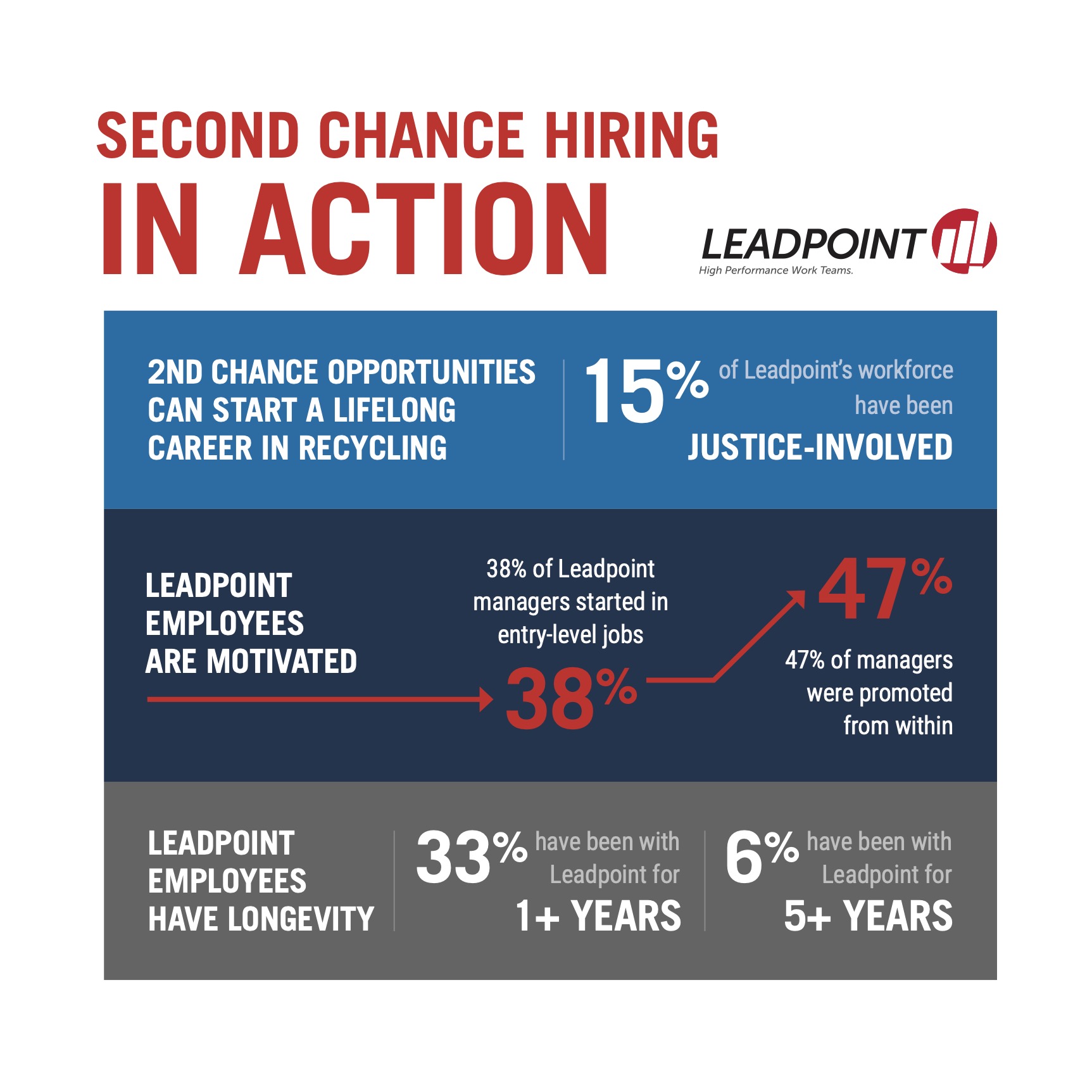As seen in Waste Advantage – November 2023
In 2018, upon her release from prison, Maiko Joslin embarked on a new journey by landing an entry-level position at Leadpoint Business Services, a workforce solutions company specializing in the waste and recycling industry. Before taking this role, Maiko developed her skills and work ethic through various work release positions, such as Peer Counselor and working in general labor roles. These experiences not only gave her a sense of purpose, but also equipped her with the skills needed for the demanding role of a recycling sorter.
While sorting recyclables might not be the most glamorous job, Maiko was genuinely appreciative of the chance to work as a full-time employee of Leadpoint. She eagerly anticipated a fresh start in the recycling industry, recognizing that it provided both stability and potential for growth.
The Benefits
Second chance hiring refers to the practice of offering fair and equal employment opportunities to individuals with prior criminal records. This non-traditional hiring practice creates opportunity for both employers and job seekers alike.
Expand Talent Pool
In a highly competitive labor market, adjusting hiring standards provides a more extensive range of options for both employers and job seekers. This approach enables the exploration of a valuable new talent pool. According to the Second Chance Business Coalition, more than 80 million Americans, which accounts for a quarter of the population, have a criminal record.
Improve Employee Retention and Performance
Research demonstrates that individuals with a criminal record often exhibit loyalty, productivity, and engagement. A 2021 Society for Human Resource Management report found that 85 percent of HR professionals and 81 percent of business leaders believe that employees with criminal records performed the same or better than those without.
Improve Workforce Diversity
Second chance hiring promotes diversity in the workplace by giving individuals with prior criminal records a chance to reintegrate into society and contribute to the workforce. This diversification can bring fresh perspectives, experiences, and talents to the team.
Gain Tax Incentives
Employers can benefit from tax incentives for second chance hiring. The federal Work Opportunity Tax Credit offers a tax credit of up to 25 percent of the first year’s wages for qualified ex-felons who work at least 120 hours, and up to 40 percent for those working more than 400 hours.
Support Your Community
Unemployment places a significant burden on social services and government programs. Expanded hiring creates wage earners who contribute to the economy and society.
Reduce Recidivism
The U.S. Chamber of Commerce has recognized that offering consistent employment opportunities to individuals with prior criminal records reduces the likelihood of reoffending and contributes positively to society. Sustained employment offers stability, financial well-being, and a sense of purpose, all of which play pivotal roles in deterring further criminal activity.

Strategic Planning
When contemplating the transition to a second chance employer, it is crucial to be prepared for adjustments in your recruitment practices, training methods, and workplace culture to foster inclusivity. Consider these strategies when implementing second chance hiring.
Engage with the Community
Nurture relationships with second chance hiring organizations in your local communities. Establish partnerships from the outset and increase awareness about your presence within the community.
Empower Candidates through Skills Assessment
During the interview process, give candidates the opportunity to engage in the actual work they will be performing. This hands-on approach provides transparency and eliminates recruitment bias, ensuring a level playing field for all candidates, regardless of their backgrounds.
Invest in Training and Mentorship
After hiring second chance employees, prioritize their personal development and retention. Many of these individuals are entering the workforce for the first time. Offer experienced mentors during their initial weeks to guide them, help them acclimatize to the team, and become trusted companions at work.
Structure Roles for Individual Support
Offer roles designed to provide crucial support to individuals seeking a second chance. These positions may be characterized by full-time entry-level positions with weekly pay, comprehensive benefits, immediate starts without prior experience requirements, and thorough training.
Promote Advancement Opportunities
Offer avenues for career growth. Invest in training programs to facilitate advancement when associates demonstrate integrity and initiative in learning the industry. These opportunities not only benefit their careers, but also contribute to improved retention rates.
The Power to Change Lives
Breaking down employment barriers for individuals who want to work, but face challenges due to a prior conviction or failed background checks has the potential to transform lives, support families, and create strong communities. Effective second chance hiring programs provide job seekers with a clear pathway to meaningful employment. By taking on these initial positions, individuals can transform them into long-lasting and fulfilling careers, contributing to a robust talent pipeline that reaps significant benefits for companies and communities. Successful programs not only grant job seekers a chance at employment, but also enable companies to gain a more inclusive workforce of dedicated and hardworking employees.

